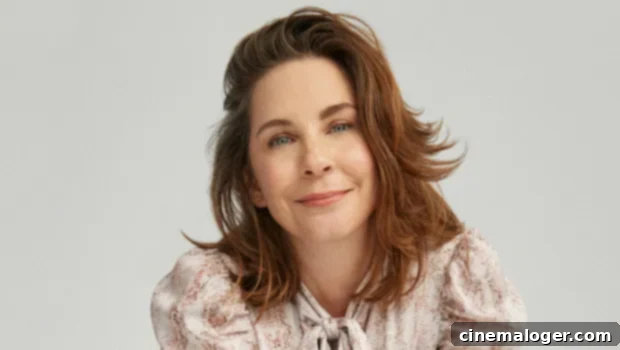Sweet Magnolias Season 2: Unpacking Mary Vaughn Lewis and Allison Gabriel’s Transformative Performance
Every captivating television series thrives on a compelling narrative, often fueled by an equally compelling antagonist. In Netflix’s beloved Southern drama, Sweet Magnolias, that role in its second season was masterfully embodied by Allison Gabriel as the formidable Mary Vaughn Lewis. From her impeccable, often floral and plaid, wardrobe to her ruthlessly strategic maneuvers, Mary Vaughn emerged as a central figure, creating significant turmoil for the beloved Magnolias – Maddie Townsend (JoAnna Garcia Swisher), Helen Decatur (Heather Headley), and Dana Sue Sullivan (Brooke Elliott) – and their families. Her actions, particularly in the season’s climactic moments, left an indelible mark, demonstrating a character driven by a potent mix of insecurity and a hunger for control.
Season two saw Mary Vaughn escalate her efforts to disrupt the lives of Serenity’s most prominent residents. Her machinations weren’t merely petty squabbles; they were calculated strikes designed to dismantle reputations and sow discord. One of her most shocking acts was digging into Coach Cal Maddox’s (Justin Bruening) past anger issues, ultimately leading to his contentious firing as the high school baseball coach. This move sent ripples throughout the community, affecting not only Cal but also Maddie, who was deeply involved with him, and the entire high school sports program. Mary Vaughn’s character arc in season two was a testament to her unwavering determination to be seen as the dominant force in Serenity, even if it meant tearing down those around her.

Allison Gabriel’s Deep Dive into Mary Vaughn’s Villainy
For Allison Gabriel, stepping back into the shoes of Mary Vaughn for the second season was an intense and sometimes unsettling experience. In an exclusive interview with HollywoodLife, Gabriel shared her visceral reaction to reading the scripts that detailed Mary Vaughn’s increasingly hostile actions. “I was feeling a bit like Frankenstein’s Monster after reading the script for that episode,” Allison revealed, highlighting the profound impact the character’s journey had on her. She admitted to feeling such a strong sense of discomfort with Mary Vaughn’s behavior that she even called her husband, expressing fears about her future on the show. “I told him, I’m getting written off this job because it’s just too horrible of a person,” she recalled, underscoring the emotional toll playing such a complex antagonist can take on an actor.
These initial anxieties were eventually assuaged after she spoke with a writer’s assistant, who reassured her about Mary Vaughn’s continued presence in Serenity. Yet, the element of surprise remained a significant factor for Gabriel throughout the season. “The second season was such a surprise to me. I wasn’t sure if I was playing her well anymore, because I felt like I didn’t have a handle on it. It felt really chaotic,” she explained. This sense of disarray for the actress mirrored the chaos Mary Vaughn was actively inflicting upon the lives of others. The storyline involving the “blackmailing the coach” specifically caught Gabriel off guard. “I couldn’t even conceptualize what that would look like or how that could even work,” she confessed, illustrating the challenge of portraying actions that felt so outlandishly cruel, even for a villain.
Unpacking Mary Vaughn’s Motivations: The ‘Queen of Serenity’ Complex
To deliver a believable performance, Gabriel had to delve deep into Mary Vaughn’s psyche, seeking to understand the underlying currents driving her malicious behavior. “As an actor, I had to make sense of it and make it real for myself,” she explained. Her conclusion offers a poignant insight into the character’s core desires: “So, I think the character, for her this is all about helping the public see her as this all powerful, all involved, woman. The ‘Queen’ of Serenity.” This perspective frames Mary Vaughn’s actions not just as random acts of cruelty, but as desperate bids for recognition and control within her social sphere. Her relentless pursuit of power seems to stem from a profound need to assert her dominance and secure her position at the top of Serenity’s social hierarchy, a position she believes is rightfully hers.

Gabriel further elaborated on what she believes fuels Mary Vaughn’s relentless antagonism. The Baby Driver actress posits that a deep-seated feeling of being “left out” is a primary motivator. “Humans are social animals, even though we love our quiet time alone, we are social animals and to feel left out of a group, if it’s just three girls — more like the most beloved girls — I think that can drive you to do crazy stuff,” she articulated. This vulnerability adds a layer of complexity to Mary Vaughn, transforming her from a one-dimensional antagonist into a character whose cruelty might be rooted in her own insecurities and a desperate longing for acceptance and belonging. The Magnolias, with their unbreakable bond and central role in Serenity, represent everything Mary Vaughn covets and feels excluded from, fueling her resentment and desire to undermine their happiness.
Mary Vaughn’s Impact on Serenity and the Magnolias
Mary Vaughn’s presence in Sweet Magnolias season 2 was far more than just a minor annoyance; her actions had tangible, detrimental consequences for several key characters. Her relentless campaign against Coach Cal Maddox, culminating in his termination, was a major narrative thrust. By digging into his past and exposing old anger management issues, Mary Vaughn weaponized information, demonstrating her willingness to cross ethical lines to achieve her objectives. This act not only jeopardized Cal’s career and financial stability but also introduced significant stress into his blossoming relationship with Maddie, one of the show’s core romances. The repercussions of this event resonated deeply, forcing Cal to confront his past and Maddie to navigate the complexities of supporting him amidst public scrutiny.
Beyond Coach Cal, Mary Vaughn’s animosity extended to all three Magnolias. She subtly (and not-so-subtly) tried to undermine their businesses, their relationships, and their social standing. Her constant need to assert superiority in Serenity’s tight-knit community often manifested in passive-aggressive remarks or outright challenges to the Magnolias’ influence. This consistent antagonism provided a rich source of conflict, forcing Maddie, Helen, and Dana Sue to stand firm in their convictions and rely on their unwavering friendship to navigate the turbulence. Mary Vaughn served as a mirror, reflecting the challenges of maintaining peace and integrity in a small town where reputations and social dynamics are paramount.
The Thematic Role of Villainy in Sweet Magnolias
In a show celebrated for its warmth, friendship, and optimistic spirit, Mary Vaughn Lewis serves as a vital counterpoint. Her villainy isn’t just for shock value; it’s thematically crucial. She represents the darker undercurrents that can exist even in seemingly idyllic towns like Serenity. Her character highlights themes of envy, social status, and the destructive power of unresolved personal issues. By posing a consistent threat, Mary Vaughn forces the Magnolias and other characters to confront difficult choices, strengthen their bonds, and reaffirm their values. Without such a formidable antagonist, the moments of triumph and resilience would not feel as earned or impactful.
Moreover, Mary Vaughn’s character allows Sweet Magnolias to explore the nuances of human behavior. Is she simply evil, or is she a product of her environment, driven by past hurts and societal pressures? Allison Gabriel’s interpretation leans towards the latter, suggesting a character who, despite her harmful actions, is also deeply flawed and perhaps even pitiable in her desperate quest for validation. This depth prevents her from becoming a cartoonish villain and instead makes her a more realistic and, at times, frustratingly relatable antagonist.
What Lies Ahead: A New Threat for Serenity?
As Sweet Magnolias season 2 concluded, a new shadow loomed over Serenity, hinting that Mary Vaughn Lewis might not be the sole architect of discord for long. The final scenes dramatically introduced a mysterious blonde figure slashing Dana Sue’s catering truck tires, signaling the arrival of a fresh wave of challenges. This cliffhanger leaves viewers eagerly anticipating how this new antagonist will fit into Serenity’s complex social fabric and whether she will present a challenge to Mary Vaughn’s established position as the town’s primary antagonist. Will she be an ally to Mary Vaughn, or will she emerge as a rival, potentially giving Mary Vaughn “a run for her money”?
The introduction of a new “mean girl” raises intriguing possibilities for future seasons. It could lead to an alliance of antagonists, creating an even greater challenge for the Magnolias, or it could spark a power struggle between the two, providing unexpected dynamics and perhaps even a moment where Mary Vaughn finds herself in an unfamiliar position of vulnerability. Regardless, it ensures that Serenity, despite its charm, remains a town where drama and unexpected twists are always around the corner, keeping the Magnolias – and viewers – on their toes. Allison Gabriel’s compelling portrayal of Mary Vaughn Lewis has set a high bar for villainy in Sweet Magnolias, making her a character that fans love to hate and whose next move is always eagerly awaited. The ongoing saga of Serenity’s social landscape promises continued intrigue as these formidable women navigate friendships, rivalries, and the ever-present drama of small-town life.
